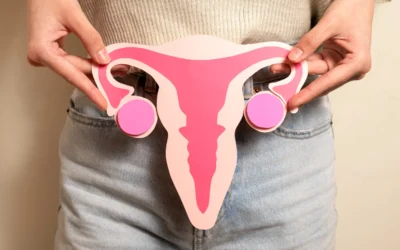Menopause is a biological milestone every woman will eventually face, yet it remains one of the most misunderstood phases of life. Popular culture, outdated medical beliefs, and lack of open discussion have created a cloud of myths that distort our understanding of menopause. These myths don’t just misinform—they can profoundly impact a woman’s mental, emotional, and physical wellbeing.
Each year, over 1.3 million women in the U.S. alone begin their transition into menopause. Despite its universality, the conversation around it often remains steeped in fear, stigma, and silence. Many women enter this life stage feeling unprepared and unsupported—believing misconceptions that exacerbate symptoms, create confusion, and hinder access to care.
This article aims to clear the air by debunking five of the most damaging menopause myths. By examining what the science truly says and highlighting practical strategies for support, we hope to empower women with the clarity they need to take charge of their health and wellbeing during this pivotal time.
In This Article
Myth #1: Menopause Begins at 50
While 50 is often cited as the “typical” age for menopause, this is more of an average than a rule. The truth is that menopause—the point when a woman has gone 12 consecutive months without a menstrual period—can happen anytime between the late 30s and early 60s.
More accurately, the journey begins with perimenopause, the transitional phase that precedes menopause. Perimenopause can last 4 to 10 years and is marked by fluctuating hormone levels, especially estrogen and progesterone. During this time, women may experience symptoms such as:
- Irregular periods
- Hot flashes
- Sleep disturbances
- Mood swings
- Vaginal dryness
A 2024 study published in the Journal of Women’s Midlife Health found that nearly 10% of women experience menopause before age 45—a condition known as early or premature menopause. Factors such as genetics, autoimmune conditions, smoking, and cancer treatments can also influence the timing.
Understanding the variability of menopause onset is crucial. If women believe it only begins at 50, they may overlook early signs or delay seeking support. This can lead to unmanaged symptoms and increased distress.
Myth #2: Menopause Will Make You Gain Weight No Matter What
One of the most persistent and demoralizing myths is that menopause causes unavoidable weight gain. While it’s true that many women notice changes in their body composition during midlife, attributing all weight gain to menopause is an oversimplification.
The shift in hormone levels—particularly a decline in estrogen—can influence how fat is stored, often leading to increased abdominal fat. But other factors are also at play, including decreased muscle mass, lower physical activity, sleep disturbances, and stress. Natural aging slows metabolism, and lifestyle patterns established over decades can play a bigger role than hormones alone.
The good news? Weight gain is not inevitable. Research shows that regular exercise, especially resistance training, can counteract muscle loss and boost metabolism. A Mediterranean-style diet rich in lean protein, whole grains, healthy fats, and fiber also supports hormonal balance and healthy weight.
In a 2023 randomized clinical trial published in Menopause, postmenopausal women who adopted a combined nutrition and exercise plan lost more weight and improved body composition compared to those who made no changes. Small, sustainable lifestyle shifts—not hormone changes alone—make the biggest difference. those who made no changes. Small, sustainable lifestyle shifts—not hormone changes alone—make the biggest difference.
Myth #3: Menopause Ends Your Sex Life
Another widespread misconception is that menopause destroys sexual desire and intimacy. While hormonal changes can affect sexual health, the reality is far more nuanced—and often hopeful.
Estrogen plays a key role in maintaining vaginal tissue elasticity and natural lubrication. When levels drop during menopause, some women may experience:
- Vaginal dryness
- Pain during intercourse
- Decreased libido
However, these changes are not insurmountable. Modern treatment options include:
- Vaginal moisturizers and lubricants: Over-the-counter products help ease dryness and discomfort.
- Localized estrogen therapy: Safe for many women, this restores vaginal health without significant systemic absorption.
- Testosterone therapy: In certain cases, it can help improve libido, although it’s not FDA-approved for this use in women in the U.S.
Just as importantly, menopause often brings a newfound sense of self-awareness and confidence. Many women report more satisfying sexual experiences post-menopause due to better communication, more time, and reduced anxiety around pregnancy.
A 2024 survey by the North American Menopause Society (NAMS) found that 62% of women over 50 rated their sexual satisfaction as equal to or better than in their 30s—with communication and emotional intimacy being key drivers.
Menopause doesn’t have to be the end of a woman’s sex life. With the right approach, it can mark a new beginning.
Myth #4: Menopause Causes Depression
Mood changes are common during perimenopause and menopause, but it is inaccurate—and potentially harmful—to assume that menopause directly causes depression.
Hormonal fluctuations can impact neurotransmitters like serotonin and dopamine, contributing to symptoms such as irritability, anxiety, mood swings, and sleep disruptions. However, clinical depression—a persistent, diagnosable mental health condition—typically arises from multiple factors.
Women with a history of depression or anxiety, those experiencing severe menopausal symptoms like insomnia or hot flashes, or those navigating stressful life events like caregiving or divorce may be more vulnerable. Lack of social support can also amplify emotional struggles.
What’s vital to understand is that menopausal mood disturbances are treatable. Cognitive Behavioral Therapy (CBT), mindfulness, physical activity, and—in some cases—hormone therapy or antidepressants can be effective.
A 2022 meta-analysis in The Lancet Psychiatry concluded that CBT significantly reduces menopause-related anxiety and depressive symptoms, especially when combined with lifestyle changes.
Open dialogue, appropriate screening, and individualized care plans are key. Dismissing emotional changes as “just hormones” can prevent women from seeking help when they need it most. emotional changes as “just hormones” can prevent women from seeking help when they need it most.
Myth #5: There’s No Specialized Care for Menopause
Many women wrongly believe there’s no such thing as a menopause specialist. As a result, they may suffer in silence or Many women wrongly believe there’s no such thing as a menopause specialist. As a result, they may suffer in silence or bounce between healthcare providers who dismiss or minimize their symptoms.
In reality, there is an entire medical subspecialty focused on menopause care. The North American Menopause Society (NAMS) certifies healthcare professionals with advanced training in midlife women’s health. These practitioners understand the nuanced balance of hormone therapy, lifestyle interventions, and mental health support.
Menopause management is also a growing area of interest among gynecologists, endocrinologists, and primary care physicians—many of whom now receive training in hormone health. Telemedicine and digital health platforms are expanding access to menopause care, especially in underserved areas.
Knowing where to turn for support can be empowering. You can find help through NAMS-certified practitioners, university-affiliated women’s health clinics, or telehealth services like Elektra Health, Gennev, and Midi Health.
Access to knowledgeable care makes a world of difference. When women feel heard, informed, and supported, they are more likely to seek effective treatment and improve their quality of life.
Navigating Menopause with Confidence
While debunking myths is the first step, practical support is essential for managing the transition with ease. Here’s how women can take charge of their menopause journey:
Prioritize Lifestyle Interventions
A balanced lifestyle is one of the most effective tools for managing menopause symptoms. Focus on:
- Nutrition: Include foods rich in calcium, magnesium, and omega-3s. Limit caffeine and alcohol, which can exacerbate hot flashes.
- Exercise: Aim for 150 minutes of moderate aerobic activity weekly. Strength training helps preserve bone density and muscle mass.
- Sleep hygiene: Establish consistent routines, reduce screen time before bed, and manage night sweats with breathable fabrics or cooling products.
Consider Hormone Therapy—If It’s Right for You
Hormone Replacement Therapy (HRT) can be highly effective for relieving moderate to severe symptoms like hot flashes, night sweats, and vaginal dryness. Despite past concerns, modern HRT is safer than once thought, especially when started before age 60 or within 10 years of menopause onset.
The decision to use HRT should be made with a knowledgeable provider and tailored to personal risk factors, such as cardiovascular health or cancer history.
Build Emotional and Social Support
Menopause can feel isolating, but it doesn’t have to be. Talking with friends, joining online communities, or participating in support groups can create a sense of solidarity and shared wisdom.
Professional counseling or coaching can also help women navigate identity shifts, changing relationships, and evolving goals during this life stage.
Conclusion
Menopause is not a disease—it’s a transition. But when it’s misunderstood, it can feel like a burden. The myths surrounding menopause have long served to disempower women, making them feel out of control, invisible, or broken.
By separating fact from fiction, we can reshape the menopause narrative from one of decline to one of transformation. Whether you’re in your 30s and curious, in your 40s and experiencing early signs, or in your 50s and seeking relief, know this: You are not alone, and you are not powerless.
Empowerment begins with education. By embracing evidence-based truths and advocating for comprehensive care, women can thrive—not just survive—through menopause and beyond.
References
- UT Southwestern Medical Center. (2024). Menopause is having a moment: Debunking common myths. https://utswmed.org/medblog/menopause-myths/
- NYU Langone Health. (2023). Five Menopause Myths You Should Stop Believing Now. https://nyulangone.org/news/five-Menopause-myths-you-should-stop-believing-now
- Women’s Health Network. (2025). Top 10 menopause myths — busted!. https://www.womenshealthnetwork.com/menopause-and-perimenopause/menopause-myths/
- Office on Women’s Health. (2025). Menopause symptoms and relief. https://womenshealth.gov/menopause/menopause-symptoms-and-relief
- NHS. (2022). Menopause. https://www.nhs.uk/conditions/menopause/things-you-can-do/
- PMC. (2015). Empowerment and Coping Strategies in Menopause Women. https://pmc.ncbi.nlm.nih.gov/articles/PMC4441783/
- The Lancet Psychiatry. (2022). Efficacy of cognitive behavioural therapy on menopause-related mood changes. https://www.thelancet.com/journals/lanpsy
- North American Menopause Society. (2024). Menopause healthcare provider directory. https://www.menopause.org/










0 Comments